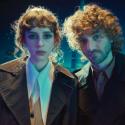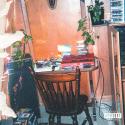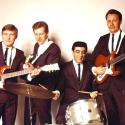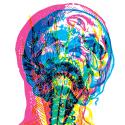“Betsy,” a voice shouts from the audience as the encore begins. The request for “Betsy on the Roof,” from Julia Holter’s 2015 Have You in my Wilderness album, is met – it was already in the set list – but only after “Les Jeux to You” is performed. That originally appeared on 2018’s Aviary.
This show is the Los Angeles-based Holter’s first song-focused outing in London since 2019. There was an accompaniment to the film The Passion of Joan of Arc in 2022, but this more traditional date follows the recent release of her sixth solo studio album Something in the Room She Moves. It’s one of a few European shows – Belgium and Germany come after London – which precede a US tour taking up much of May. The encore underlines the balance between meeting expectations and pushing forward. Old favourites are obligatory but there is newer material to get into, to state where things are now.
Holter’s always-particular sound-world changes each time it surfaces on record
At Hackney’s EartH Theatre (the name contracts Evolutionary Arts Hackney: Holter played here in 2018), half the 12-song set is dedicated to selections from the 10-track Something… Alongside the new material, other mainstays: “In the Green Wild,” “I Shall Love 2” and set-opener “Sea Calls me Home” amongst them. The new album is not neglected for this attentive audience.
Concomitant with the spirit of moving on, Holter’s always-particular sound-world changes each time it surfaces on record. Something… is jazzier than anything which has come earlier, intimating an immersion in Alice Coltrane’s devotional synthesiser-based work and then fusing it with a glistening psychedelic sensibility akin to the more far-out aspects of Judy Henske and Jerry Yester’s 1969 Farewell Aldebaran album. Then, factor in what might be nods to Debussy, Eric Dolphy and Roland Kirk while retaining a long-standing yen for folk-rooted melodies and Sixties barque pop. This was going to be tricky to pull off live.
At this sold-out show, Holter is accompanied by Beth Goodfellow (drums, percussion, vocals), Dev Hoff (fretless electric bass) and her life partner Tashi Wada (keyboards, bagpipes, wind instruments). Interestingly, the live sound is by Kenny Gilmore, who has co-produced and mixed her studio recordings – clearly, there’s a desire to be as careful as possible with framing what’s heard. For the vocal-only “Meyou,” she is joined by Jenny Hval, Jenny Berger Myhre and Linn Nystadnes (in town to play The Barbican). Apart from “Meyou,” Holter is at the front, stood behind her keyboard.
As with the care taken about the studio-crisp live sound, much of the performance feels as if it is about precision: where the players are feeling-out the songs. An impression borne out by Holter’s music stand and the attention paid to the papers upon it. However, the energy level picks up a half-hour in during “Silhouette.” Late in the set, Something’s… “Talking to the Whisper” concludes with a free-form psych-out.
A symmetry between the instinctive and deliberate isn’t entirely realised
Such meticulousness doesn’t mean it’s a laboratory of sound, more that a lot of thought has gone into what was always going to be a non-standard presentation. Hoff’s sliding, slithering Mick Karn-esque fretless bass adds to the distinctiveness, as do Goodfellow’s oscillations between circularity and a machine-precise pulse: she is thrillingly to the fore on “Spinning.” Wada’s bagpipes may seem like quirk for the sake of it, yet as part of the whole they assume an organ-like role.
Then, there is Holter and her songs. Typically, they aren’t linear – in this context, “Betsy on the Roof” is her “Let it be” or, even “Stairway to Heaven” – but played live without studio arrangements they are exposed as alive, playful: despite the heaviness of what’s inspired them or their lyrical obliqueness. “Spinning” is excitable. “In the Green Wild” smoulders. This art-music can hit hard.
Nonetheless, symmetry between the instinctive and deliberate isn’t entirely realised. As a composer and recording artist, Julia Holter’s approach to music as an art form is methodical. As a performer, Julia Holter can be less systematic. It’s just that it takes a while to loosen up.















Add comment